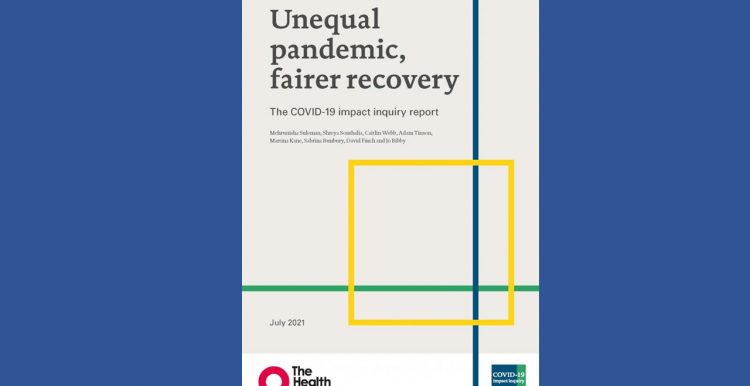The Health Foundation publish their COVID-19 impact inquiry report

To do this, we must acknowledge the health and socio-economic inequalities that fuelled the death toll.
Background to the inquiry
The Health Foundation started their impact inquiry in the Autumn of 2020 with a guiding principle to understand how the UK’s experience of the pandemic could inform future decisions of a government that has stated its commitment to improving the health of its population.
The Health Foundation’s COVID-19 impact inquiry has drawn on a broad range of available evidence to consider two main questions:
1. How were people’s experiences of the pandemic influenced by their pre-existing health and health inequalities?
2. What is the likely impact of actions taken in response to the pandemic on the nation’s health and health inequalities – now and in the future?
Five Key Findings from the COVID-19 Impact inquiry report include:
- poor health and existing inequalities left parts of the UK more vulnerable to the virus
- the pandemic has revealed stark differences in the health of the working age population
- some groups – young people, disabled people, ethnic minority communities and care home residents – have been more affected than others
- type and quality of work, housing conditions and access to financial support to self-isolate all contributed to increased exposure to the virus among working age adults
- in recovery there is an opportunity to create a healthier, more resilient society
What’s next?
The inquiry did not set out to formulate specific policy recommendations. It instead points national and local policymakers to two areas of action - In the short term, to address the harm caused by the pandemic and prevent longer-term effects, while also building resilience long term.
Unequal pandemic, fairer recovery is the name of the report published by the Health Foundation in July 2021, read the full report here.
Healthwatch Hertfordshire’s response to the inquiry report
Steve Palmer, Chair of Healthwatch Hertfordshire said:
"The Covid pandemic is not over and its effects are likely to continue for many years impacting, in particular, the groups identified on this report. Reducing inequalities is not just desirable but essential if we are serious about improving the health of all.
This report makes a valuable contribution in identifying the ongoing effects of Covid nationally. Moving forward, our research programme will build on these findings to help create a local picture and we will use our role as an independent organisation to influence change, as the NHS and social care tackle the challenges of inequality.”


